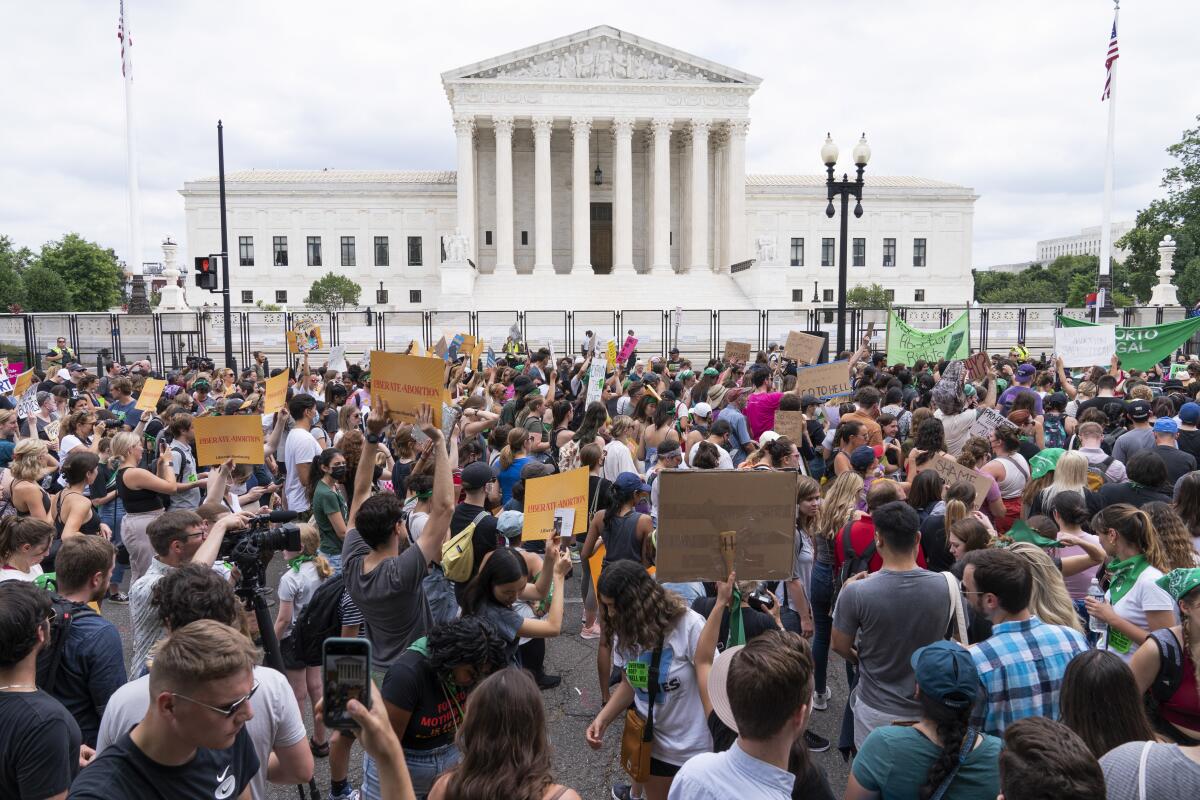Op-Ed: The Supreme Court is not accountable to the people. So what can check its power?

- Share via
If Supreme Court justices had to run for reelection, a number of them would be in big trouble. Last week the court issued radical decisions that boldly defied American opinion on both abortion and guns. It overturned Roe vs. Wade and about 20 other cases that had protected the right to abortion for a half-century. And in the wake of some of the worst mass shootings in American history, it struck down a New York law dating to 1911 that required people to demonstrate a need before being authorized to carry a gun in public.
But Supreme Court justices have their jobs for life. We can’t send them packing (short of impeachment, which is limited to high crimes and misdemeanors). What, then, can those of us who feel violated by the court’s raw exercise of power do?
In both the abortion case, Dobbs v. Jackson Women’s Health Organization, and the gun case, New York State Rifle & Pistol Assn. vs. Bruen, the court is out of step with the nation. Polls consistently show a large majority of Americans favored upholding Roe, and more than three quarters of New Yorkers supported that state’s limits on carrying guns.
If you are angry, you should be. But how should we respond?
Amending the Constitution is so difficult that it’s virtually impossible. Some have urged the appointment of additional justices to alter the court’s ideological alignment. The Constitution does not specify how many justices must be on the court, and the number has varied over time from five to 10, so nothing in the Constitution stops the appointment of more justices.
But that’s both unrealistic and a bad idea. The only president even to propose such a move was Franklin Delano Roosevelt, in response to a Supreme Court that was striking down New Deal legislation. But even though FDR was one of the most powerful presidents of all time, and the court at the time was exceedingly unpopular, the American people never supported his plan. (The court eventually shifted its approach, however, and started upholding the New Deal laws, perhaps in response to FDR’s threat.)
If FDR could not muster political support to expand the court at the height of the Great Depression, when New Deal laws were widely viewed as essential, what chance would President Biden have?
Packing the court is also a bad idea in principle. It would invite tit-for-tat responses whenever either party gained control of the political branches. That would do nothing to depoliticize the court, and would probably make it more partisan than it already is.
But that doesn’t mean we are without options. History shows that when the court departs from where the people stand on fundamental issues, a popular reaction generally leads to a correction. Thus, the New Deal-era court began upholding laws protecting workers and consumers. Such adjustments can go both ways. Popular criticism of the expansion of criminal defendants’ rights in the 1960s, including the right to remain silent and to exclude illegally seized evidence from court, led the court, regrettably, to weaken those rights in the following decades.
The court is not immune to the world around it. Consider the antiabortion movement’s response to Roe vs. Wade. They didn’t accept the decision as the last word. For 50 years, they organized, voted and lobbied to ban abortion — and last week, they prevailed. But just as Roe wasn’t the end of the story, nor is Dobbs. All who care about ensuring women’s right to be equal citizens with control over their bodies should take a page from antiabortion activists — and mobilize.
Support state legislative and constitutional initiatives to protect the right to abortion. Contribute to funds to help women travel to states where abortion remains lawful. Press the federal government to make medication abortion as widely available as possible and to pay for it. And file lawsuits in state courts invoking state constitutions to provide the protection that, for now, the federal Constitution does not afford.
On guns, too, there remains much we can do. Justice Brett Kavanaugh and Chief Justice John Roberts wrote separately in Bruen to explain that states can impose gun requirements as long as they place limits on licensing officials’ discretion. For decades, the principal obstacle to gun control was not the Supreme Court, but politicians beholden to the National Rifle Assn. The politics of guns may well be changing, and active engagement with gun-control organizations can speed that along.
The Supreme Court is an anomaly in a democracy: an institution with great power that is not directly accountable to the people. There are good reasons for its insulation from ordinary politics. We call on it to defend rights of the most vulnerable and least politically powerful. But when it fails to do so, we need not accept its decisions as ending the debate.
Most important, we must elect politicians who believe in the right to abortion and the need for reasonable gun control — and then hold them to it. The best way to respond to decisions like Dobbs and Bruen is to use our civil liberties to defend the values we hold most dear.
David Cole is national legal director of the American Civil Liberties Union and a professor at Georgetown University Law Center.
More to Read
A cure for the common opinion
Get thought-provoking perspectives with our weekly newsletter.
You may occasionally receive promotional content from the Los Angeles Times.










